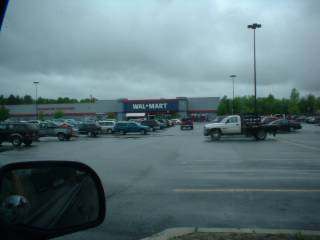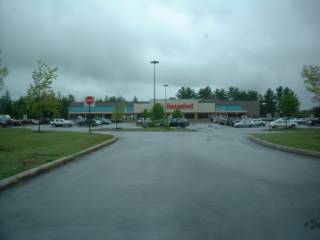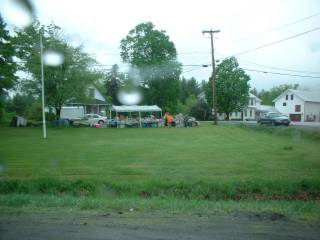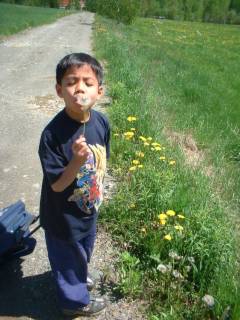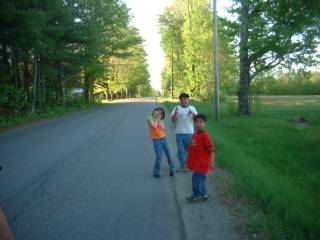
Tuesday, May 25, 2004
Trip to the shopping store
I saw 2 horses with blankets. My initial reaction was amusement...thought the owner just wanted to dress up his horses...Gary told me it was a blanket and that kept the horses warm during chilly days like today.


Sunday, May 23, 2004
I can still treat and do minor operations here!
Dad called me up early this morning. He accidentally sustained a small cut on his finger, ,and asked me whether I have something here to fix it with. I said I had gauze and anesthesia, but no syringe, no needle, no sutures. He said he thought did not need suturing. So I told him to come so I could take a look at it.
When I saw him, the cut was bandaged already by Mom (quite good!). I starter unwrapping the finger and they warned me that it was bleeding quite profusely. It was quite superficial, actually. And the bleeding had stopped secondary to the pressure and the platelet plug local reaction at the injury. It was a clean cut. I just had to add antibacterial ointment, wrapped it again with a fresh sterile gauze, putting more padding on the wound site, giving instructions to come back tomorrow same time to replace the gauze. I had no worry about the wound.
After that, Dad hugged me, told me this was the first time he hugged his doctor. He was thankful that I am now here, that it was so handy to have a doctor available always. Then he shared stories about how he had watched as vets treated and/or operated on animals. I learned that I could buy syringes and needles without prescription (common to buy those because there are a lot of farmers who use them on the cows and chickens and pigs). Plus, his aunt has been an RN for 30 years now, and had access to antibiotics and other medical supplies. Wow! My eyes were twinkling! I could still "practice" my profession (although limited to friends and families only) without having the need to get a license! That is just so great! Because then I would have a means to treat simple-to-manage illnesses like pneumonia, UTI, pharyingitis, otitis media, etc. and that would mean a more cost-effective medical management, and a lot cheaper! Oh, God is really good...
When I saw him, the cut was bandaged already by Mom (quite good!). I starter unwrapping the finger and they warned me that it was bleeding quite profusely. It was quite superficial, actually. And the bleeding had stopped secondary to the pressure and the platelet plug local reaction at the injury. It was a clean cut. I just had to add antibacterial ointment, wrapped it again with a fresh sterile gauze, putting more padding on the wound site, giving instructions to come back tomorrow same time to replace the gauze. I had no worry about the wound.
After that, Dad hugged me, told me this was the first time he hugged his doctor. He was thankful that I am now here, that it was so handy to have a doctor available always. Then he shared stories about how he had watched as vets treated and/or operated on animals. I learned that I could buy syringes and needles without prescription (common to buy those because there are a lot of farmers who use them on the cows and chickens and pigs). Plus, his aunt has been an RN for 30 years now, and had access to antibiotics and other medical supplies. Wow! My eyes were twinkling! I could still "practice" my profession (although limited to friends and families only) without having the need to get a license! That is just so great! Because then I would have a means to treat simple-to-manage illnesses like pneumonia, UTI, pharyingitis, otitis media, etc. and that would mean a more cost-effective medical management, and a lot cheaper! Oh, God is really good...
Saturday, May 22, 2004
Another teaching opportunity today
Patrick called me...I was almost done with the dishes. Then I went to him.
He was with Ben at the living room. They showed me what they killed. An insect that stung Patrick twice on his right thigh. He showed me his small wheals. I explained to him about how such insects can inject to the skin some foreign material/substances that can elicit reactions in our body: blood rushes to the site of the insect bite/sting; releases chemicals that cause reddening, itchiness and swelling. Then on I went to explain hypersensitiivity reaction using the movie "My Girl" as an illustration, telling them about anaphylactic reaction in some people who are hypersensitive.
Patrick showed fear on his face. Maybe he thought he would die too. I told him to stay calm and listen to me.
Anaphylaxis is the kind of hyperreaction to such allergenic compounds that the swelling of cells might cause the airway to get smaller and smaller until the person can't breathe in air. I told them without air we will die. I told them not all people are hyperreactive. I illustrated to him my sister Joy's hyperreaction to an allergen that cause gigantic wheals all over her body and extremeties. I told him his wheal was very small in comparison. I told him our body is equipped with tools to protect us from foreign matter like dirt, not only with our antibodies but with other mechanisms as well, like the formation of pear in an oyster when a snad particle gets inside: layers of coating are deposited to get rid of the irritation.
Then I went on to tell him what to do to minimize the discomforts of such sting: the pain caused by the swelling, the redness and itchiness caused by the chemicals released by blood that rushed to the site. I told him to prevent the blood rush (to limit release of the chemicals) by cooling the site using ice instead of scratching (which would actually heat up the area increasing the blood circulation and would damage more capillaries, causing more premature release of chemicals). He did as I told him.
Now those impromptu lectures no nanny (not even my sister or mother!) can give to my children...
He was with Ben at the living room. They showed me what they killed. An insect that stung Patrick twice on his right thigh. He showed me his small wheals. I explained to him about how such insects can inject to the skin some foreign material/substances that can elicit reactions in our body: blood rushes to the site of the insect bite/sting; releases chemicals that cause reddening, itchiness and swelling. Then on I went to explain hypersensitiivity reaction using the movie "My Girl" as an illustration, telling them about anaphylactic reaction in some people who are hypersensitive.
Patrick showed fear on his face. Maybe he thought he would die too. I told him to stay calm and listen to me.
Anaphylaxis is the kind of hyperreaction to such allergenic compounds that the swelling of cells might cause the airway to get smaller and smaller until the person can't breathe in air. I told them without air we will die. I told them not all people are hyperreactive. I illustrated to him my sister Joy's hyperreaction to an allergen that cause gigantic wheals all over her body and extremeties. I told him his wheal was very small in comparison. I told him our body is equipped with tools to protect us from foreign matter like dirt, not only with our antibodies but with other mechanisms as well, like the formation of pear in an oyster when a snad particle gets inside: layers of coating are deposited to get rid of the irritation.
Then I went on to tell him what to do to minimize the discomforts of such sting: the pain caused by the swelling, the redness and itchiness caused by the chemicals released by blood that rushed to the site. I told him to prevent the blood rush (to limit release of the chemicals) by cooling the site using ice instead of scratching (which would actually heat up the area increasing the blood circulation and would damage more capillaries, causing more premature release of chemicals). He did as I told him.
Now those impromptu lectures no nanny (not even my sister or mother!) can give to my children...
Learning for children does not only happen at school...
Chocolates as incentive for the kids?
My husband frequently buys me a bar of white chocolate when he goes to buy quickly some items needed like milk and catfood. I don't ask him to buy any for the kids.
What I do is that I share my chocolates with them, often as a small piece of dessert after a meal.
They don't complain about the paucity of what they get; rather, they enjoy the thought (as I analyze it) that we share something.
This morning, I asked them to clear the table after they had rice porridge for Christmas. Ben did most of it, so I gave him 3 squares of the chocolate, then gave 2 to Patrick.
Patrick questioned my distribution. I told him the reason: Ben did what I asked him to do, so I gave him a reward by giving a bonus square of chocolate.
Quite rebelling, Patrick began to scowl. I ignored it. I went on with what I plan to do that morning: weeding and mulching my flower garden.(anecdote about this aspect I posted in my garden blog)
Later I went back in to prepare lunch: carbmeat-veggie frittata. Upon nearing the end of my cooking, I asked the kids to set the table. Patrick was the one who quickly responded. I told him, I would give him his reward (extra chocolate square) after lunch.
So we ate lunch (I did not know what to prepare for Gary; he doesn't really care much for such foods.)
While eating I told the boys that the one who ate more vegetable would get more chocolate. Patrick reminded me that it was him who tend to do that, plus he set the table (but he did not ask for an extra choco to make two bonus squares).
And so after lunch, I gave them my promised treat: 2 squares for Ben, 3 for Patrick.
Ben was not happy; he felt I was being unfair. I reiterated my reasons for Patrick's bonus squares, and I reminded him about his bonus earlier for clearing up the table after breakfast.
The selfish him (as in what about me? Me! Me!) could not accept my reasoning; he started crying, soft at first getting louder. For a second I had the urge to give him an extra piece, but I fought it. I told him I would not give him choco squares so he would stop crying. No, that would defeat my purpose. That would just encourage him to do the same thing over and over to get what he wants. I told him that what I wanted was to give the reward when they have done something good like helping me with household chores, studying, being good with each other. He acted as if he never understood a thing I said. I shrugged it off, and went on with clearing the debris off the dishes before putting them in the dishwasher. His audible sobs became louder; I was irritated so I told him to go to their area (they use the living room space at the moment as their sleep/play room), to which he complied.
As I went on with the dishes, Patrick, pleased with himself and with my reaction to Ben's attitude, stayed close to me. I took that opportunity to share with him my experiences as a child. I told him I did that too when I was that age; that I knew Ben would stop soon; if not, he might experience hyperventilation syndrome. I explained to him what that syndrome was: the hyperventilation cause by sobs would drown the blood with oxygen, disturbing the pH, resulting in manifestations as coldness of the extremeties and rigidity of muscles that the person might find it hard to move, making him panic, making him breathe harder, palpitate more because of nervousness, increasing the O2 level in his blood, making it worse.
His face showed concern. I told him not to worry, because I know what to do in that case: to put a plastic or paperbag over Ben's nose and mouth, such that he will breathe back in the carbon dioxide that he exhaled (I asked Patrick if he knew what we inhale in and exhale out; he answered correctly). I went on to explain to him that we need to get to the right pH of Ben's blood, which was neutral. I told him about O2 making the blood more basic or alkaline; CO2 making it more acidic. Inhaling CO2 back from that paperbag into the body would make the blood more acidic, while lessening the O2 level, thus lessening the alkalinity of the blood more. Pretty soon it would bring the blood back to the normal level which was about 7 (then I told him that less pH is more acidic; higher pH is more basic).
Maybe the information was quite overwhelming, but if he encounters that again in the future, he will find it easier to grasp upon recalling this precious lecture moment with me.
Then Ben's cry became a wail that made Gary go down and ask me what caused Ben to do that (because he had been doing it for like half an hour and it was already annoying). I told him to just ignore him. But Gary was really irritated, so I told him to tell Ben about it, which he did (told him to stop crying).
Immediately after that I went to Ben to make peace. I asked him to stop crying and reiterated my reasons for not giving him more chocolates when he tries crying as a strategy.He stopped crying as soon as I touched him. I asked him if he understood my reasons for giving Patrick moroe chocolate. He nodded. I told him I would not want him to do that strategy again to get what he wants from me. He nodded. Then I told him, Sige, bati na tayo. Okay?" (Peace, okay?). He nodded and put his arms around me. I kissed him on the cheek and hugged him. I still did not give him more chocolates. We went on with our businesses. Later on he was giggling with Patrick, and was actually trying to please me.
Who said that we should avoid hurting our children's feelings? I think, if it is necessary to teach them a lesson, we should let them get hurt (with the above incident, I did not intentionally hurt him. I was trying to make my point that I want to be fair to them at all times. He felt hurt, and I could not blame him, but he had to change that attitude.)
I actually felt that they became closer to me, and I felt satisfaction and accomplishment at that.
My husband frequently buys me a bar of white chocolate when he goes to buy quickly some items needed like milk and catfood. I don't ask him to buy any for the kids.
What I do is that I share my chocolates with them, often as a small piece of dessert after a meal.
They don't complain about the paucity of what they get; rather, they enjoy the thought (as I analyze it) that we share something.
This morning, I asked them to clear the table after they had rice porridge for Christmas. Ben did most of it, so I gave him 3 squares of the chocolate, then gave 2 to Patrick.
Patrick questioned my distribution. I told him the reason: Ben did what I asked him to do, so I gave him a reward by giving a bonus square of chocolate.
Quite rebelling, Patrick began to scowl. I ignored it. I went on with what I plan to do that morning: weeding and mulching my flower garden.(anecdote about this aspect I posted in my garden blog)
Later I went back in to prepare lunch: carbmeat-veggie frittata. Upon nearing the end of my cooking, I asked the kids to set the table. Patrick was the one who quickly responded. I told him, I would give him his reward (extra chocolate square) after lunch.
So we ate lunch (I did not know what to prepare for Gary; he doesn't really care much for such foods.)
While eating I told the boys that the one who ate more vegetable would get more chocolate. Patrick reminded me that it was him who tend to do that, plus he set the table (but he did not ask for an extra choco to make two bonus squares).
And so after lunch, I gave them my promised treat: 2 squares for Ben, 3 for Patrick.
Ben was not happy; he felt I was being unfair. I reiterated my reasons for Patrick's bonus squares, and I reminded him about his bonus earlier for clearing up the table after breakfast.
The selfish him (as in what about me? Me! Me!) could not accept my reasoning; he started crying, soft at first getting louder. For a second I had the urge to give him an extra piece, but I fought it. I told him I would not give him choco squares so he would stop crying. No, that would defeat my purpose. That would just encourage him to do the same thing over and over to get what he wants. I told him that what I wanted was to give the reward when they have done something good like helping me with household chores, studying, being good with each other. He acted as if he never understood a thing I said. I shrugged it off, and went on with clearing the debris off the dishes before putting them in the dishwasher. His audible sobs became louder; I was irritated so I told him to go to their area (they use the living room space at the moment as their sleep/play room), to which he complied.
As I went on with the dishes, Patrick, pleased with himself and with my reaction to Ben's attitude, stayed close to me. I took that opportunity to share with him my experiences as a child. I told him I did that too when I was that age; that I knew Ben would stop soon; if not, he might experience hyperventilation syndrome. I explained to him what that syndrome was: the hyperventilation cause by sobs would drown the blood with oxygen, disturbing the pH, resulting in manifestations as coldness of the extremeties and rigidity of muscles that the person might find it hard to move, making him panic, making him breathe harder, palpitate more because of nervousness, increasing the O2 level in his blood, making it worse.
His face showed concern. I told him not to worry, because I know what to do in that case: to put a plastic or paperbag over Ben's nose and mouth, such that he will breathe back in the carbon dioxide that he exhaled (I asked Patrick if he knew what we inhale in and exhale out; he answered correctly). I went on to explain to him that we need to get to the right pH of Ben's blood, which was neutral. I told him about O2 making the blood more basic or alkaline; CO2 making it more acidic. Inhaling CO2 back from that paperbag into the body would make the blood more acidic, while lessening the O2 level, thus lessening the alkalinity of the blood more. Pretty soon it would bring the blood back to the normal level which was about 7 (then I told him that less pH is more acidic; higher pH is more basic).
Maybe the information was quite overwhelming, but if he encounters that again in the future, he will find it easier to grasp upon recalling this precious lecture moment with me.
Then Ben's cry became a wail that made Gary go down and ask me what caused Ben to do that (because he had been doing it for like half an hour and it was already annoying). I told him to just ignore him. But Gary was really irritated, so I told him to tell Ben about it, which he did (told him to stop crying).
Immediately after that I went to Ben to make peace. I asked him to stop crying and reiterated my reasons for not giving him more chocolates when he tries crying as a strategy.He stopped crying as soon as I touched him. I asked him if he understood my reasons for giving Patrick moroe chocolate. He nodded. I told him I would not want him to do that strategy again to get what he wants from me. He nodded. Then I told him, Sige, bati na tayo. Okay?" (Peace, okay?). He nodded and put his arms around me. I kissed him on the cheek and hugged him. I still did not give him more chocolates. We went on with our businesses. Later on he was giggling with Patrick, and was actually trying to please me.
Who said that we should avoid hurting our children's feelings? I think, if it is necessary to teach them a lesson, we should let them get hurt (with the above incident, I did not intentionally hurt him. I was trying to make my point that I want to be fair to them at all times. He felt hurt, and I could not blame him, but he had to change that attitude.)
I actually felt that they became closer to me, and I felt satisfaction and accomplishment at that.
Friday, May 21, 2004
Our House during Spring
Kite Flying in Spring
On a sunny spring day, my two boys have fun flying kites...no expensive electronic toys needed. Yung field na yan, right side ng lote namin, at lahat ng visible trees, kasama sa 90-acre land namin. Kaya kahit hirap kami financially ngayon, di mo masasabing nagdarahop. Overall, our life is satisfactory. Mabait pa rin ang Diyos. And I am most thankful sa malinis na paligid, sariwang hangin, maraming puno, kaunting sasakyan na maaaring makasagasa sa mga bata, malawak na espasyo para maglaro, walang magnanakaw (pwede mong iwan na bukas ang bahay o kotse, kahit me bag ka pa run!). Kulang na lang, pati kayong pamily ko sa PInas at Canada, kasama ko sana...anyway, salamat pa rin sa internet, mas madali ang balitaktakan, kumpara noon siguro grabeng homesickness ng mga OFWs nung mga 70's-80's...
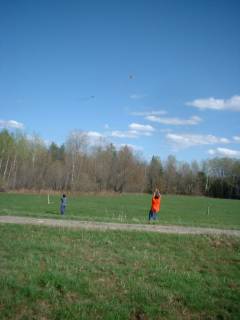

Thursday, May 20, 2004
A Walk in Spring
PINAY WINS BIG IN LONDON
By Alfred Yuson
The Philippine Star 05/16/2004
Patricia Evangelista, a 19-year-old, Mass Communications sophomore of
University of the Philippines (UP)-Diliman, did the country proud
Friday night by besting 59 other student contestants from 37
countries in the 2004 International Public Speaking competition
conducted by the English Speaking Union (ESU) in London.
She triumphed over a field of exactly 60 speakers from all over the
English-speaking world, including the United States, United Kingdom
and Australia, reported Maranan.
The board of judges' decision was unanimous, according to contest
chairman Brian Hanharan of the British Broadcasting Corp. (BBC).
Patricia's short speech worth reading .....
BLONDE and BLUE EYES
When I was little, I wanted what many Filipino children all over the
country wanted. I wanted to be blond, blue-eyed, and white.
I thought -- if I just wished hard enough and was good enough, I'd
wake up on Christmas morning with snow outside my window and
freckles across my nose!
More than four centuries under western domination does that to you.
I have sixteen cousins. In a couple of years, there will just be
five of us left in the Philippines, the rest will have gone abroad
in search of "greener pastures." It's not just an anomaly; it's a
trend; the Filipino diaspora. Today, about eight million Filipinos
are scattered around the world.
There are those who disapprove of Filipinos who choose to l eave. I
used to. Maybe this is a natural reaction of someone who was left
behind, smiling for family pictures that get emptier with each
succeeding year. Desertion, I called it. My country is a land that
has perpetually fought for the freedom to be itself. Our heroes
offered their lives in the struggle against the Spanish, the
Japanese, the Americans. To pack up and deny that identity is
tantamount to spitting on that sacrifice.
Or is it? I don't think so, not anymore. True, there is no denying
this phenomenon, aided by the fact that what was once the other side
of the world is now a twelve-hour plane ride away. But this is a
borderless world, where no individual can claim to be purely from
where he is now. My mother is of Chinese descent, my father is a
quarter Spanish, and I call myself a pure Filipino-a hybrid of sorts
resulting from a combination of cultures.
Each square mile anywhere in the world is made up of people of
different ethnicities, with national identities and individual
personalities. Because of this, each square mile is already a
microcosm of the world. In as much as this blessed spot that is
England is the world, so is my neighbourhood back home.
Seen this way, the Filipino Diaspora, or any sort of dispersal of
populations, is not as ominous as so many claim. It must be
understood. I come from a Third World country, one that is still
trying mightily to get back on its feet after many years of
dictatorship. But we shall make it, given more time. Especially now,
when we have thousands of eager young minds who graduate from
college every year. They have skills. They need jobs. We cannot
absorb them all.
A borderless world presents a bigger opportunity, yet one that is
not so much abandonment but an extension of identity. Even as we
take, we give back. We are the 40,000 skilled nurses who support the
UK's National He alth Service. We are the quarter-of-a-million
seafarers manning most of the world's commercial ships. We are your
software engineers in Ireland, your construction workers in the
Middle East, your doctors and caregivers in North America, and, your
musical artists in London's West End.
Nationalism isn't bound by time or place. People from other nations
migrate to create new nations, yet still remain essentially who they
are. British society is itself an example of a multi-cultural
nation, a melting pot of races, religions, arts and cultures. We
are, indeed, in a borderless world!
Leaving sometimes isn't a matter of choice. It's coming back that
is. The Hobbits of the shire travelled all over Middle-Earth, but
they chose to come home, richer in every sense of the word. We call
people like these balikbayans or the 'returnees' -- those who
followed their dream, yet choose to return and share their mature
talents and good fortune.
In a few years, I may take advantage of whatever opportunities come
my way. But I will come home. A borderless world doesn't preclude
the idea of a home. I'm a Filipino, and I'll always be one. It isn't
about just geography; it isn't about boundaries. It's about giving
back to the country that shaped me.
And that's going to be more important to me than seeing snow outside
my windows on a bright Christmas morning.
Mabuhay and Thank you.
from my inbox
The Philippine Star 05/16/2004
Patricia Evangelista, a 19-year-old, Mass Communications sophomore of
University of the Philippines (UP)-Diliman, did the country proud
Friday night by besting 59 other student contestants from 37
countries in the 2004 International Public Speaking competition
conducted by the English Speaking Union (ESU) in London.
She triumphed over a field of exactly 60 speakers from all over the
English-speaking world, including the United States, United Kingdom
and Australia, reported Maranan.
The board of judges' decision was unanimous, according to contest
chairman Brian Hanharan of the British Broadcasting Corp. (BBC).
Patricia's short speech worth reading .....
BLONDE and BLUE EYES
When I was little, I wanted what many Filipino children all over the
country wanted. I wanted to be blond, blue-eyed, and white.
I thought -- if I just wished hard enough and was good enough, I'd
wake up on Christmas morning with snow outside my window and
freckles across my nose!
More than four centuries under western domination does that to you.
I have sixteen cousins. In a couple of years, there will just be
five of us left in the Philippines, the rest will have gone abroad
in search of "greener pastures." It's not just an anomaly; it's a
trend; the Filipino diaspora. Today, about eight million Filipinos
are scattered around the world.
There are those who disapprove of Filipinos who choose to l eave. I
used to. Maybe this is a natural reaction of someone who was left
behind, smiling for family pictures that get emptier with each
succeeding year. Desertion, I called it. My country is a land that
has perpetually fought for the freedom to be itself. Our heroes
offered their lives in the struggle against the Spanish, the
Japanese, the Americans. To pack up and deny that identity is
tantamount to spitting on that sacrifice.
Or is it? I don't think so, not anymore. True, there is no denying
this phenomenon, aided by the fact that what was once the other side
of the world is now a twelve-hour plane ride away. But this is a
borderless world, where no individual can claim to be purely from
where he is now. My mother is of Chinese descent, my father is a
quarter Spanish, and I call myself a pure Filipino-a hybrid of sorts
resulting from a combination of cultures.
Each square mile anywhere in the world is made up of people of
different ethnicities, with national identities and individual
personalities. Because of this, each square mile is already a
microcosm of the world. In as much as this blessed spot that is
England is the world, so is my neighbourhood back home.
Seen this way, the Filipino Diaspora, or any sort of dispersal of
populations, is not as ominous as so many claim. It must be
understood. I come from a Third World country, one that is still
trying mightily to get back on its feet after many years of
dictatorship. But we shall make it, given more time. Especially now,
when we have thousands of eager young minds who graduate from
college every year. They have skills. They need jobs. We cannot
absorb them all.
A borderless world presents a bigger opportunity, yet one that is
not so much abandonment but an extension of identity. Even as we
take, we give back. We are the 40,000 skilled nurses who support the
UK's National He alth Service. We are the quarter-of-a-million
seafarers manning most of the world's commercial ships. We are your
software engineers in Ireland, your construction workers in the
Middle East, your doctors and caregivers in North America, and, your
musical artists in London's West End.
Nationalism isn't bound by time or place. People from other nations
migrate to create new nations, yet still remain essentially who they
are. British society is itself an example of a multi-cultural
nation, a melting pot of races, religions, arts and cultures. We
are, indeed, in a borderless world!
Leaving sometimes isn't a matter of choice. It's coming back that
is. The Hobbits of the shire travelled all over Middle-Earth, but
they chose to come home, richer in every sense of the word. We call
people like these balikbayans or the 'returnees' -- those who
followed their dream, yet choose to return and share their mature
talents and good fortune.
In a few years, I may take advantage of whatever opportunities come
my way. But I will come home. A borderless world doesn't preclude
the idea of a home. I'm a Filipino, and I'll always be one. It isn't
about just geography; it isn't about boundaries. It's about giving
back to the country that shaped me.
And that's going to be more important to me than seeing snow outside
my windows on a bright Christmas morning.
Mabuhay and Thank you.
from my inbox
Subscribe to:
Comments (Atom)
